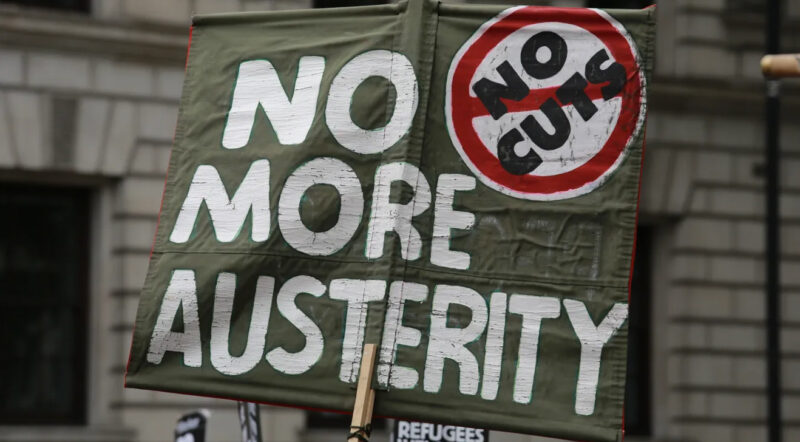Solid strike at Unilever Leeds: now escalate to defend pensions
 Forty Unilever workers from the night shift, USDAW reps and officials and supporters joined picketlines outside the big Leeds plant at Seacroft to kick off the second 24-hour strike. Workers were angry that the giant company is closing their final salary pension scheme, a huge cut to future retirement funds, while it is still making megaprofits. A week of rolling strikes, with different plants out on different days across the UK, began on 18 January with a two day strike at the Warrington plant, after a national one-day strike last December.
Forty Unilever workers from the night shift, USDAW reps and officials and supporters joined picketlines outside the big Leeds plant at Seacroft to kick off the second 24-hour strike. Workers were angry that the giant company is closing their final salary pension scheme, a huge cut to future retirement funds, while it is still making megaprofits. A week of rolling strikes, with different plants out on different days across the UK, began on 18 January with a two day strike at the Warrington plant, after a national one-day strike last December.
The pickets were upbeat, waving flags as workers leaving the last shift in their cars leaned on their horns and raised their fists in support. Workers said nearly everyone would come out again and sure enough you could count the scabs going in on one hand. Security guards closed the entrance gate at 6pm – Unilever management didn’t even bother to pretend the plant would run. Workers: 2 – Unilever: 0 so far.
The workforce is mainly organised by Unite with 1,600 members, while Usdaw has 460 and the GMB has 170 members. A one-day national strike on 9 December – the first in Unilever’s history – was solid and workers remained determined in this second round to win.
Pension cuts = big profits
Unilever is one of the top five consumer goods companies in the world and owns scores of major global brands including PG Tips, Dove, and Persil. The pension cuts would affect 5000 of its 7000 strong UK workforce in favour of a career average defined benefits scheme, which could see workers losing anything up to twenty percent of the value of their pensions. In 2008 it closed the final salary scheme to new starters while hiking contributions from existing workers, promising that this would mean making it “sustainable”. Now the company has ripped this up and is going for further savings.
Despite the crisis Unilever bosses aren’t exactly hurting. Its most recent profits logged in a £6.1billion, up more than £1bn on the previous year. Company boss Paul Polman gets an annual package worth £3 million, not including the £300,000 deposited into his pension scheme! Cuts for the workers mean more profits for bosses, pure and simple.
The final salary scheme is not in crisis and is sustainable, yet the company claims that it is a “broken model” and that its closure is non-negotiable. If the change goes through it is likely that Unilever is will come back in a few years time and make more cuts.
Escalate to win
Now management is hoping to sit out the strikes and at best make token concessions, if any. The workers need to quickly escalate the strike, up to all-out if necessary, to win.
The upbeat mood in Leeds, where Usdaw organises the majority of workers, has been reproduced across the country as the week long schedule of rolling strikes began. If Unilever bosses still refuse to budge after this week’s action, then workers need to dig in too. As one night shift worker at Leeds told us, “The problem is we’re on strike today, but on Sunday they’ll make up the production in overtime. We need to go out for two or three days at least.” Indeed the Warrington and Purfleet plants both took two day strike action from Wednesday and Thursday. Why not send a clear signal to Unilver in the next round: three days one week, four days the next, then all-out?
Unilever workers can learn from the 2009-2010 BA strikes, where Unite leaders imposed on the workers a long, exhausting series of one day actions and concession after concession, so that after two years they settled with no gains. And the GMB and Usdaw are unlikely to provide a better strategy, they are generally more timid than Unite! The workers need to organise jointly across union divide and take control of the strike themselves to ensure it is effective.
Workers’ democracy
The solid strikes show too that non-union members are supporting the action. Mass meetings are the way to bring newer layers of angry workers into the debate on the way forward and into the unions. Elected plant strike committees could involve workers from all three unions to ensure the strike is united and solid, the goal of defending the current final salary scheme is made clear to all, and the strategy (along with any offers from the company) is decided by the workforce. This is especially true since the three unions’ officials have already proposed savings and other concessions. Unilever is rolling in the money, why make a single one! It just signals weakness and makes them hold out for longer.
It is vitally important that union officials do not whittle down members’ morale with one day strikes and concessions to the point where it means ultimately accepting a pension deal not much different from what Unilever bosses are already offering. This would damage the shopfloor union strength, besides consigning workers to a much worse pension. A victory will mean a great boost to union organisation, creating a solid obstacle to any future cuts which are sure to come.
One woman striker repeated a sentiment that many had agreed after discussion, “They should bring everyone out across the country against what the Tories are doing.” That is a debate the entire union movement needs to have, private and public sector, fighting pensions or jobs and other cuts. A general strike to bring down Tory austerity should be the pole star the union movement orients by in the current crisis. We should demand union leaders coordinate our actions, escalate them to all out, and strike a fighting deal: we all stay out until all claims are settled – for a general strike to kick out the Tories!
Unilever workers can make links with other workers in Unite by means of Grass Roots Left, the rank and file initiative, wihile similar initiatives in Usdaw and GMB could bring together the wing of the union that wants a fighting, winning policy and members’ democracy too. A rank and file movement and local, open coordinations with delegates from the various workplaces would allow private sector workers fighting pensions to strike alongside public sector workers doing the same. That’s the way Unilever can be beaten, and a general strike to kick out the Tories can come about at the same time!






